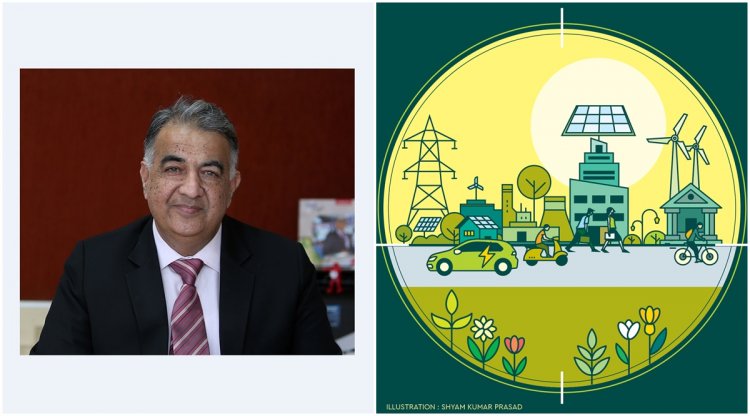The rise and rise of tech: Vetting company strategies through a sustainability lens
In 2022, it could become mandatory for every enterprise to lay out and execute a comprehensive sustainability strategy—a tall order that will require more focused leadership, especially here in Asia Pacific, including in India

2021 has been a bonanza year for India’s technology industry. Digital transformation has become a critical strategic priority for enterprises, cloud investments have been prioritised and companies across sectors have been embracing transformative technologies to develop relevant solutions. Sustainability has been another key trend as enterprises embed it into their business to address the climate crisis. Even the amazing march of the unicorns has been a exhilarating feature of the year with a variety of firms participating in the new valuation stories. Truly speaking, 2021 has been a watershed year for Indian tech and the pathways for the next decade have been truly illuminated, say the CEOs of some of the top tech firms
By Shailender Kumar
Sustainability is critical to 42% of company strategies in India, according to a recent Frost & Sullivan report. Indeed, beyond meeting compliance and regulatory goals, increasingly people of all ages—especially the young—are evaluating companies’ sustainability track records and commitments through a sustainability lens before they commit their money. Additionally, enterprises, in both the public and the private sectors, are starting to do much of the same with their suppliers and partners, holding them— and themselves—accountable for reducing their carbon emissions.
No wonder that increasingly we see more and more environment friendly raw materials in use, greener manufacturing processes being employed and renewable energy being utilised, wherever possible. In situations where bio-degradable materials may not be suitable, recycled ones are taking their place. In India, we also clearly see the government pushing for sustainability in its Sustainable Development Goals. During the recently concluded COP 26 Summit, India’s Prime Minister announced a target of zero emissions for the country by year 2070.
Certainly, recognising that sustainability is an important paradigm to act upon is the big first step in preserving our environment. Soon, it may not be a matter of choice. In 2022, it could become mandatory for every enterprise to lay out and execute a comprehensive sustainability strategy—a tall order that will require more focused leadership, especially here in Asia Pacific, including in India. Forrester reports in its Predictions 2022 report that among Fortune Global 200 companies, APAC falls well behind North America and EMEA in appointing a sustainability lead at the VP, director, or other executive level.
Additionally, according to the same report, only 30% of Global 2000 companies in Asia Pacific are “taking real action” when it comes to making their sustainability efforts more transparent, creating a funded sustainability function, and ultimately reducing their carbon footprint or e-waste. As per Forrester’s report, for most firms in the region, sustainability efforts are driven by compliance and investor pressure, not strategic planning and risk management. Such a shortsighted approach checks the box, but will not materially affect climate change. In fact it runs the risk of misleading environmentally attuned customers and partners.
“Real action” requires enterprises to change some of the fundamentals of their business. Oracle, for example, has committed to running all of the cloud regions that power its infrastructure and application servers on 100% renewable energy by 2025. And it’s requiring that all its key suppliers—both for direct manufacturing and indirect procurement—have environmental programmes in place by 2025 that include emissions-reduction targets.
One clever idea that comes to mind, among others, on how enterprises can engage customers in sustainability efforts is: what if retailers, logistics companies, and other shippers of physical products were to offer their customers delivery choices that included information on the environmental impact, and not just the speed? What if they charge customers less or offer other incentives for selecting the most environmentally friendly option? If adopted, such a practice could both make an environmental difference and enhance a company’s brand.
Of course, enterprises increasingly will rely on advanced information technologies to support their sustainability efforts. For example, Indian agricultural cooperative, IFFCO, analyses massive amounts of data in developing its eco-friendly “nano-technology” fertiliser, capable of cutting use of conventional chemical fertilizers in half while raising crop outputs.
Then there is BSES Rajdhani Power (BRPL) that provides power to over 2.7 million customers in West and South Delhi. It ran a trial of the first territory-wide Home Energy Report (HER) programme in the country some time ago. With help of modern cloud technologies, customers were empowered with crucial information that could help them make better choices and manage their consumption of power more efficiently.
Change by so many will not be easy, and there will not be a single answer. It will require behaviour change, policy and regulatory change, business model change, and technological change. To make these sustainability goals a reality for the nation, every enterprise must integrate with these initiatives and work together with the administration for seamless alignment. But you must agree it is worth it. After all, our wellbeing tomorrow depends solely on how sustainable we are today.
The writer is senior vice president and regional managing director, Oracle India







